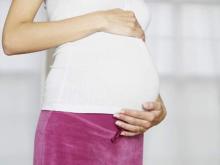SAN FRANCISCO – Excessive gestational weight gain increased the risk of cesarean delivery in all ages; however, less so in pregnant teens than in adults in a population-based cohort study of more than 1,000,000 births.
Dr. Margaret E. Beaudrot and her colleagues at the University of Cincinnati looked at all births in Ohio from 2006 to 2012, focusing on the 309,935 live singleton births to first-time mothers.
They assessed the association between body mass index, gestational weight gain, and cesarean delivery risk among four groups: teens younger than 15 years, teens aged 15-17 years, teens aged 18-19 years, and adult women aged 20-34. Data were adjusted for breech presentation and labor induction.
Most births (78.5%) were to adult women. Among teen mothers, 15% were aged 18-19 years, 6% were aged 15-17 years, and less than 1% were under age 15.
The overall cesarean rate was 27%. Cesareans were significantly more common in adults (29%) than in mothers younger than 15 years (18%), 15-17 years (18%), and teens aged 18-19 years (21%).
Three factors were associated with having a cesarean delivery: maternal age, BMI, and excessive gestational weight gain, Dr. Beaudrot said at the annual meeting of the American College of Obstetricians and Gynecologists.
More than half of women in all groups had excessive gestational weight gain based on 2009 recommendations from the Institute of Medicine.
Close to half (44%) of obese adult women with excessive gestational weight gain had a cesarean, as did about a third (32%) of overweight adult women with excessive gestational weight gain. Even in women who started their pregnancy at a normal BMI, 26% with excessive weight gain had a cesarean delivery.
Compared with adults, teens had a 47% lower risk of cesarean delivery (adjusted OR 0.53). Across all BMI categories, cesarean rates were higher in teens based on excessive weight gain, with rates ranging from 14% in 15- to 17-year olds who gained too little weight to 24% in 18- to 19-year olds who gained too much weight.
Cesarean rates were lowest in normal-weight teens under 18 years who gained an appropriate amount of weight.
The data “highlight the importance of [patient] education on optimal gestational weight gain, regardless of age in an attempt to reduce the primary c-section rate overall, especially in those at highest risk, obese women of all ages,” Dr. Beaudrot said.
On Twitter @denisefulton


